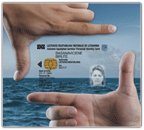20 November, 2007
category: Government
Gemalto’s Vice President of Business Development and Government Affairs, Neville Pattinson, testified before U.S. Congress urging the Department of Homeland Security (DHS) to make privacy and security of government credentials, such as REAL ID and WHTI cards, a high priority. At issue is how well the RFID technology being considered for enhanced driver’s licenses, REAL ID and the WHTI PASS card initiatives provides security and protects privacy for citizens. One strategy Pattinson proposed to lawmakers is to charter the U.S. National Institute of Standards and Technology (NIST) to develop standards for government issued identity cards as they did for government IDs. Pattinson sits on the board of the Smart Card Alliance, chairs its Identity Council and was honored with an Outstanding Individual Award for his contributions to the industry last year.
Gemalto’s Pattinson Testifies Before U.S. Congress on Privacy and Security of Government Identity Credentials
Gemalto’s vice president of business development and government affairs Neville Pattinson testified before the U.S. House Government Oversight Subcommittee on Government Management, urging the Department of Homeland Security (DHS) and congress to make privacy and data security the highest priorities in identification programs such as REAL ID and the WHTI card. Pattinson also sought to explain to lawmakers the differences between insecure RFID tags and secure, microprocessor based and RF-enabled contactless smart card technology.
The electronic passport and FIPS 201 Personal Identity Verification federal employee ID programs, two successful programs Pattinson held up as shining examples of getting it right, already use contactless smart card technology.
“The U.S. Momentum to Add digital security to government IDs and documents is fantastic, but to achieve their policy objectives lawmakers should select the most secure and proven technology,” said Pattinson.
At issue is how well the RFID technology being considered for enhanced driver’s licenses, REAL ID and the WHTI PASS card initiatives provides security and protects privacy for citizens.
“The digital security technology in an identity document or credential must be able to prove authenticity, protect its information and secure any communication. Secure contactless document technology meets these requirements, using an onboard computer and software to authenticate the credential, challenge other devices before providing information and encrypt any communication. RFID tags do not have any of these capabilities; they just do not compare to secure contactless personal devices,” he said.
One strategy Pattinson proposed to lawmakers is to charter the U.S. National Institute of Standards and Technology (NIST) to develop standards for government issued identity cards. “NIST did an excellent job creating secure and privacy sensitive standards for the ID card that all federal employees are now getting, the PIV card. They can do an equally good job for us citizens. They understand the technologies and the issues, and would help to ensure these programs move in the right direction,” said Pattinson.
Pattinson sits on the board of the Smart Card Alliance, chairs its Identity Council and was honored with an Outstanding Individual Award for his contributions to the industry last year. He is presently serving a three-year appointment as a special government employee to the Department of Homeland Security’s “Data Privacy and Integrity Advisory Committee.”
Pattinson testified to congress on behalf of the Secure ID Coalition, an industry association of which Gemalto is a founding member.
About Gemalto
Gemalto is the leader in digital security with pro forma 2006 annual revenues of $1.7 billion, more than 85 offices in 40 countries and about 10,000 employees including 1,300 R&D engineers. In a world where the digital revolution is increasingly transforming our lives, Gemalto’s solutions are designed to make personal digital interactions more convenient, secure and enjoyable. Gemalto provides end-to-end digital security solutions, from the development of software applications through design and production of secure personal devices such as smart cards, SIMs, e-passports and tokens to the deployment of managed services for its customers. More than a billion people worldwide use the company’s products and services for telecommunications, financial services, e-government, identity management, multimedia content, digital rights management, IT security, mass transit and many other applications.
As the use of Gemalto’s software and secure devices increases with the number of people interacting in the digital and wireless world, the company is poised to thrive over the coming years. Gemalto was formed in June 2006 by the combination of Axalto and Gemplus. For more information please visit www.gemalto.com.



